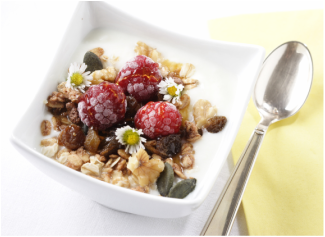 Probiotics "For Life" The literal Greek definition for probiotic is "for life", which explains why they are so important after taking antibiotics that kill both the bad and good bacteria in our bodies. But did you know that probiotics also influence how we experience life? Mood isn't all in our heads, its also in our guts. Think about all the gut-brain connections... anxiety and "butterflies" in our stomachs, depression and over- or undereating, migraine headaches and nausea, and the list goes on and on. Bacteria in our gut plays a crucial role in immunity, metabolism and even mood. Get probiotics from:
Omega-3 Fatty Acids Omega-3 fatty acids are polyunsaturated fatty acids that are essential nutrients for health. Since our bodies cannot make omega-3 fats, we must get them through food. Omega-3's are necessary for normal body function and are well known for their ability to protect against many diseases, including heart disease and cancer. They also have shown to be effective in preventing depression and managing depressive symptoms. You should aim to get at least one rich source of omega-3 fatty acids in your diet each day. This could be through a serving of fatty fish, a handful of walnuts, a tablespoon of canola or soybean oil in salad dressing or in cooking, or a tablespoon of ground flaxseed mixed into your morning oatmeal. For more intensive support, you can take a fish oil supplement. Nordic Naturals and Barlean's brands are top quality and readily available at drugstores. For personalized recommendations, consult your doctor or registered dietitian. Get omega-3 fatty acids from:
Vitamin D Most of you probably know that vitamin D is good for our bones. But you may not realize the many other ways vitamin D affects us, such as the important role it plays in mental health and depression. Research has shown a link between low levels of vitamin D in the blood and symptoms of depression. The connection isn't fully understood at this point so we can't say whether a low vitamin D increases risk for depression or if being depressed leads to vitamin D deficiency. Our bodies produce vitamin D when our skin is exposed to sunshine. Living far from the equator (like in Seattle), combined with less daylight hours in the winter time means vitamin D deficiency is very common, especially in the winter months. Taking a daily vitamin D supplement is generally a good idea for most people and you may experience some mood-improving benefits. Ask your doctor to check your vitamin D level. If your blood level is low (below 30), you'll need a high dosage for a while to rebuild your body's stores of vitamin D. Get Vitamin D from:
Breakfast Foods Start the day out right by waking up after a restful sleep and restarting your system with an energy-packed breakfast meal. Breakfast has shown to be the most beneficial meal for staying alert, maintaining concentration and supporting learning throughout the day. Eating a good breakfast with plenty of protein also ensures our brains are adequately supplied with essential nutrients for making neurotransmitters, including serotonin, norepinephrine and dopamine. These chemicals play an important role in regulating mood, appetite, digestion, sleep, memory and more. Research indicates that low levels of these substances is associated with increased incidence of depression. To make sure you're getting a good breakfast, be sure to include a combination of at least 3 foods, including complex carbohydrates, protein and fruit or veggie. Examples include:
Selenium
Selenium is an essential trace element, meaning our bodies require it in small amounts from food. Increasing selenium, especially in people with deficiency, has shown to improve mood. Some people at increased risk of selenium deficiency include vegetarians, people with gastrointestinal problems and alcoholics. Get selenium from:
|
AuthorMarlene Maltby is a Registered Dietitian Nutritionist in Seattle, WA where she specializes in pediatric & adolescent nutrition, food sensitivities, vegetarian/vegan diets and enteral tube feeding.. Prior to becoming a RDN, she completed professional training in culinary arts. Archives
September 2017
|

 RSS Feed
RSS Feed
